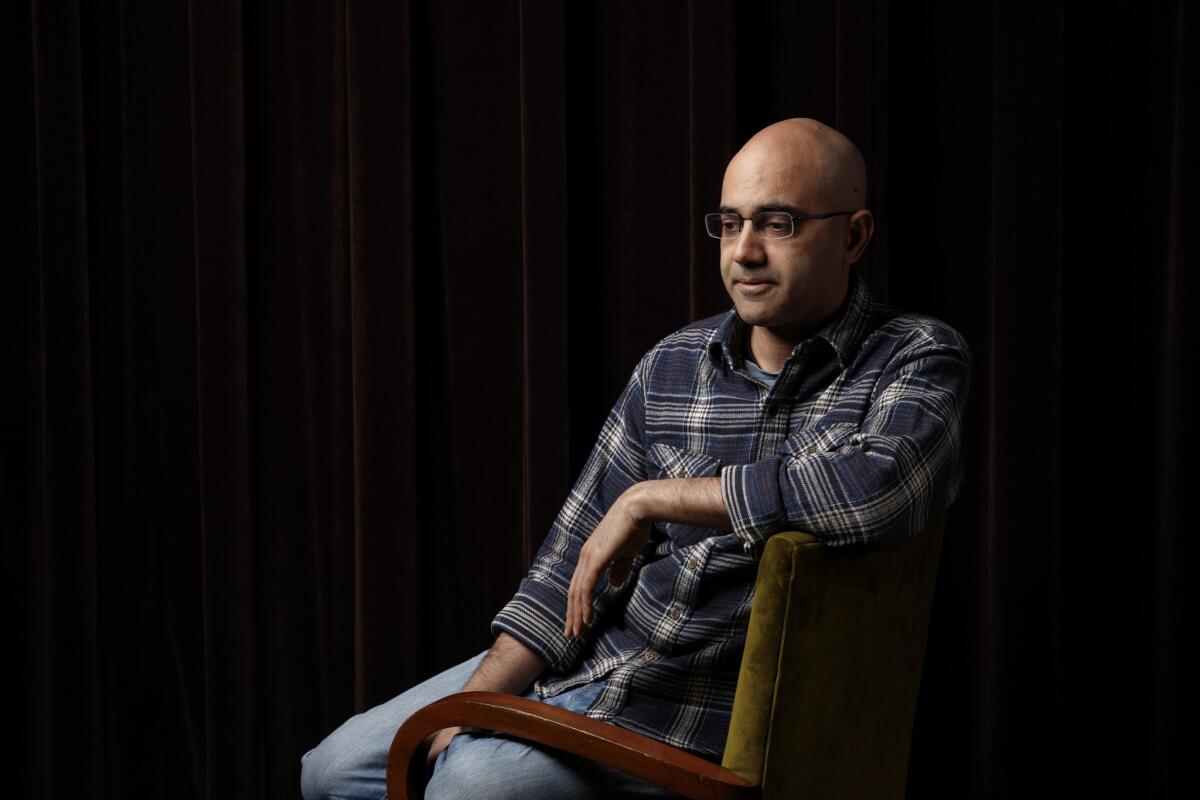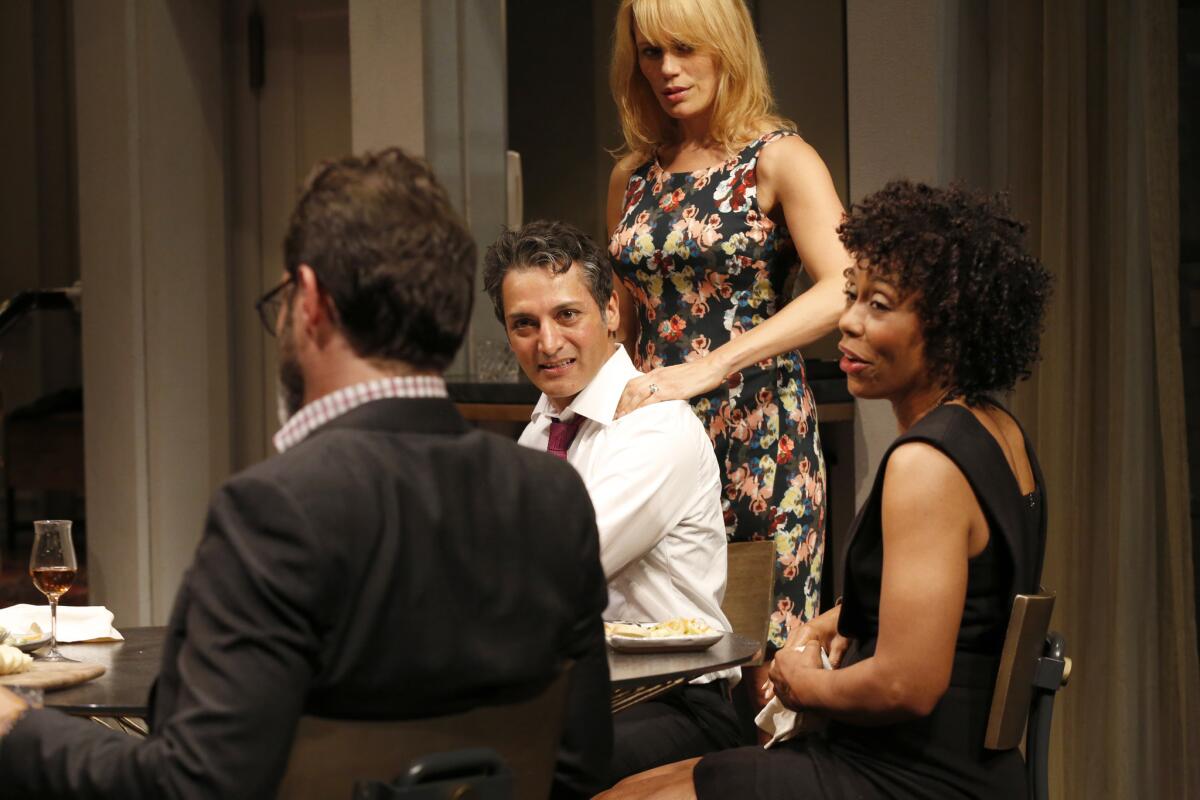‘A sickness in this country’: Pulitzer winner Ayad Akhtar on politics, Muslim life in the West, capitalism’s cruelties

The nation is in a strange and angry state, a bruising time of rising populism, anti-immigrant fervor and a searing gap between the rich and everyone else. The drama of real life seems to have eclipsed the potency of art unless you’re Ayad Akhtar, a playwright whose work speaks to the brokenness and rage that spring from fresh demons and troubling headlines.
Akhtar, a Pakistani American who grew up outside Milwaukee, sees a land in distress: terror, right-wing extremism, gun violence, consuming capitalism and a backlash against traditional politics that have given rise to Donald Trump, a showman and presumptive Republican presidential nominee who epitomizes the collision of social media, celebrity and spectacle.
“There’s a sickness in this country,” Akhtar said in the half-lit lobby at the Mark Taper Forum, days before Sunday’s carnage in a gay nightclub in Orlando that left the lone gunman and 49 victims dead. “I’m not interested in traditionally what Western-style art has embraced as its higher embodiment: This refinement of the self and the illumination of the mysteries of the human interior. I’m much more preoccupied with what’s happening out in the world.” He paused and added: “That’s the ground where the audience is right now.”
Between the body counts of mass shootings and the nastiness of our public debate, America at times resembles a coast-to-coast reality show. To many, we have become a map of vigil candles and tears, a land of suspicion and challenged identities.
Akhtar’s Pulitzer-Prize winning play, “Disgraced,” about a Pakistani American lawyer tormented by the pressures of the Muslim world and the West, is in previews and opens at the Taper on Sunday. Set in post-9/11 New York, the story of Amir Kapoor is a combustible meditation on identity and reinvention. It echoes with the immigrant dilemma: Can we cut away the kernel of who we are to be reborn as someone else in a distant place? And at what cost, especially after terrorist attacks in Paris, Brussels, San Bernardino and Orlando have rekindled mistrust for many over citizens and immigrants of Muslim heritage.
The American immigrant tale is “rupture from the old world and renewal of the self in the new world,” said Akhtar. “We celebrate the renewal. We fail to mourn the rupture. This failure speaks to the great loneliness of American life.” In the play, an enraged Amir, who turns a dinner party into a battlefield, “is caught in this mournful place” of not reconciling what he has broken with while not feeling accepted by the dream he has embraced.

The son of doctors, Akhtar, who has described himself as religious but nondenominational, has explored not only the wider Muslim immigrant themes depicted in “Disgraced” but also the tension between young and older generations over the meaning of Islam. His novel “American Dervish” is a lesson in faith and assimilation, similar to his play “The Who & the What,” about a daughter’s disagreement with her conservative father over the prophet Muhammad and women in Islam.
These days Akhtar, 45, who lived for a while in Italy and France working as an assistant director, is intrigued by globalization, extremism and the way money moves. In August, the La Jolla Playhouse will premiere his new work “Junk: The Golden Age of Debt,” a treatise on debt financing, deal-making and how a “rapacious accumulation of wealth” has dominated American life since the 1980s. His play “The Invisible Hand,” which was recently staged in London, is a study of Islamic radicalism and the force and shadowy designs of global financial markets.
Writing in the New York Times, critic Charles Isherwood said of “The Invisible Hand”: “Mr. Akhtar’s play, while perhaps not as sensationally entertaining as ‘Disgraced,’ makes a forceful point about the seemingly ineradicable terrorism roiling the Middle East. Inspired though it may be by religious ideology, it is necessarily fueled, like most other movements that drive cultural change, by the brute power of money.”
Capitalism and its insinuations are “certainly fueling my work,” he said. “America is at a crossroads not because of its inability to digest immigrants. There’s something else afoot. … Nobody can subsist in a country that has legislated and has idealized the accumulation of personal wealth. And if anybody tries to have a conversation about anything that reeks in any way of possibly rethinking this, they’re tagged socialists or communists.”
Akhtar would get along well with Oliver Stone, Neil Young and Don DeLillo. And, perhaps, Bernie Sanders. Dressed in jeans and a flannel shirt, the playwright was more animated and unabashed than he was in an interview two years ago. The gears that spin the world have sparked a creative need to explore the perniciousness beneath. In conversation, his scenarios unfolded like thrillers recounted by a linguistically clever intelligence operative fretting over the seething tenor of politics and the trappings of social media that have turned us into mean-spirited voyeurs with ever-shrinking attention spans.
He apologized for being “so intense,” but like many he is at once fascinated and repelled by what clamors through 24-hour news cycles. He settled back into his seat in the lobby, which had the air of ghosts and spilled gin. He mentioned that America never really mourned after 9/11; instead it veered into two wars, a recession and electing its first black president. Political divisions and racism persist. He said members of his family “won’t leave the house for days” after a terrorist attack for fear of reprisals. Obama’s presidency, he said, “has outed the reality of what was under the surface.”
With its mastery of tweets and sound bites, the Trump campaign has blurred the lines between politics and entertainment. This is fascinating terrain for Akhtar.
“We have these cyclical eruptions of irrationality in our national history,” he said. “Trump is a new embodiment of an eternal American phenomenon. ... Isaac Asimov said perhaps the greatest thing about America and the deep strain of anti-intellectualism in American life: ‘My ignorance is as good as your knowledge.’”
What passes for meaningful commentary “is simply the expression of somebody’s interiority,” he said. “People feel their authentic self is somehow articulated through their expression of resentment and anger.”
Anger over displacement and conflicting identities is palpable in “Disgraced.” The play is a variation on Akhtar’s work to examine, much like James Baldwin did for African Americans, the experiences, betrayals and hopes of Muslim immigrants. He does not pretend to be the voice of such a diverse group – some conservative Muslims have criticized him for negative characterizations – but he is shrewd and compassionate and understands the incendiary power of language both on- and offstage.
“I wrote the play in 2010 and I didn’t think that that kind of degradation of rhetoric could exist anywhere but the theater,” he said. “But now we’re living in a world where what’s happening on stage is not all that controversial. It’s happening everywhere, all the time, about shifts in American life.”
MORE:
At the Military Film Festival, veterans are the target audience
Not all American films travel easily. It takes expertise to connect them with foreign audiences
Twitter:@JeffreyLAT
More to Read
The biggest entertainment stories
Get our big stories about Hollywood, film, television, music, arts, culture and more right in your inbox as soon as they publish.
You may occasionally receive promotional content from the Los Angeles Times.











